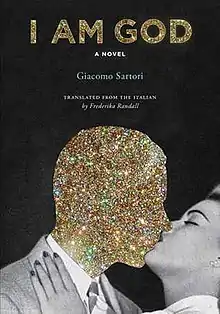I Am God (novel)
I Am God, originally published as Sono Dio, is an Italian novel by Giacomo Sartori about the Islamo-Christian God falling in love with a mortal woman. First published in 2016 and translated into English by Frederika Randall in 2019,[2] it was a critical and commercial success.
 English-language edition, 2019 | |
| Author | Giacomo Sartori |
|---|---|
| Original title | Sono Dio[1] |
| Translator | Frederika Randall[2] |
| Country | Italy |
| Language | Italian |
| Genre | Satire, comedy, epistolary[3] |
Publication date | 1 May 2016[4] |
Published in English | 5 February 2019[5] |
| ISBN | 9781632062147 |
Plot
I Am God opens with God beginning to keep a journal about his view on modern society, and in particular his infatuation with Daphne, a young geneticist. Daphne, an atheist 'post-punk' and anti-Catholic activist, attracts God's attention although he fails to understand why.[3] Much of the book is epistolary, with God as a first-person narrator through his journal, discussing his thoughts on a humanity he finds unsatisfying; language is recent to him, as the God of the novel has mostly disclaimed and damned humanity on the basis of thinking human language and thought to be evil.[6] The plot also features a love triangle between Daphne, God, and her mortal boyfriend Giovanni, an alcoholic and sexually uninhibited paleontologist.[7]
The God of I Am God has been characterized as neurotic, garrulous, and overly verbose.[8] He also holds conservative views on matters of gender and sexuality, being called "half heteronormative deity, half embarrassing uncle" by Martin Riker of The New York Times.[3]
Reception
I Am God received mostly positive reviews. Michael Alec Rose of BookPage described the novel as "delightful, strikingly current, [and] infectiously readable" and compared Sartori to great historical Italian religious artists such as Michelangelo and Dante Aligheri, saying "in his modest and profound way, Sartori belongs in this terrific company".[1] R. P. Finch of The Philadelphia Inquirer called it "a pleasure to read", but criticized the plot for being overly complex,[6] while Publishers Weekly referred to it as "an immensely satisfying feat of imagination".[7] James Livingston of The New Republic wrote a particularly in-depth review, interpreting I Am God as a meditation on the human focus on death and mortality, concepts alien to an immortal deity.[8]
Kirkus and The New York Times both gave more mixed reviews. Kirkus criticized the book for lacking sharpness and for what it interpreted as homophobic content,[5] while The New York Times, while overall positive, found the characters to be overly simplistic and the humour perhaps weakened by translation.[3]
Italian reviewers were also positive about Sono Dio, the original Italian novel. Gabriele Sabatini of Flaneri praised the novel for its sense of spirit and vigour,[9] while Stefano Zangrando of L'Indice dei libri del mese endorsed the humour and prose.[10]
See also
References
- Rose, Michael Alec (11 February 2019). "Book Review - I Am God by Giacomo Sartori". BookPage. Retrieved 2 February 2021.
- Stavans, Ilan (10 July 2020). "A Tribute to Frederika Randall, "Translator of the Unsaid"". Restless Books. Retrieved 5 February 2021.
- Riker, Martin (8 February 2019). "In This Novel, God Is Annoyed and in Love". The New York Times. Retrieved 2 February 2021.
- "Sono Dio: Sartori, Giacomo". Amazon. Retrieved 5 February 2021.
- "I AM GOD". Kirkus Reviews. 13 November 2018. Retrieved 2 February 2021.
- Finch, R. P. (15 February 2019). "'I Am God' by Giacomo Sartori: A cranky, vulnerable deity not above a little slapstick". The Philadelphia Inquirer. Retrieved 2 February 2021.
- "Fiction Book Review: I Am God". Publishers Weekly. 3 December 2018. Retrieved 2 February 2021.
- Livingston, James (2 May 2019). "Writing for the End Times". The New Republic. Retrieved 2 February 2021.
- Sabatini, Gabriele (10 October 2016). "Sono Dio - Giacomo Sartori - Recensione". Flaneri (in Italian). Retrieved 2 February 2021.
- Zangrando, Stefano (1 October 2016). "Giacomo Sartori - Sono Dio". L'Indice dei libri del mese (in Italian). Retrieved 2 February 2021.
